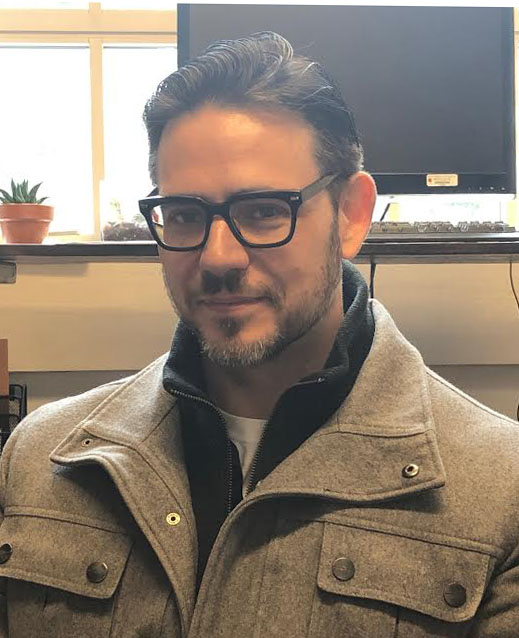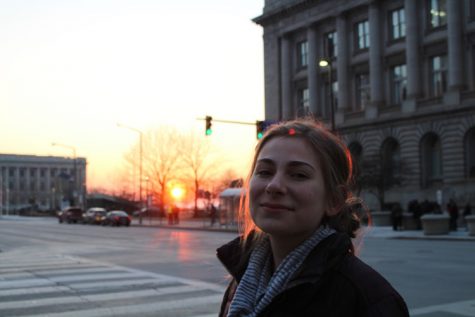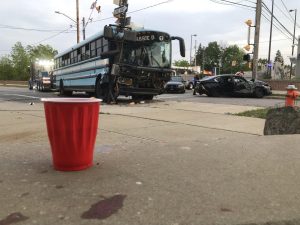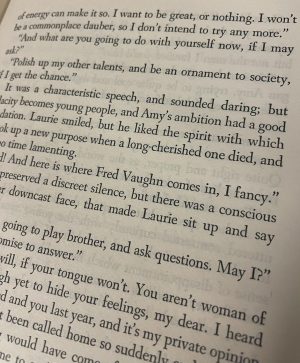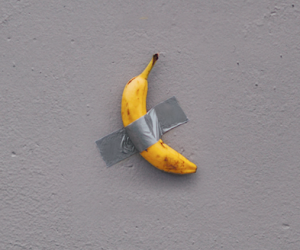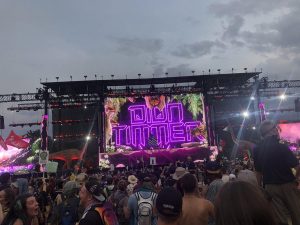JCU faculty spotlight: visiting professor William Weaver
Jan 31, 2019
“I’m going to lose my cool factor and come off as very geeky if I talk about my coolest experience,” laughed visiting communication professor William Weaver as he reflected on his film career in Los Angeles, “but the other day in class we talked about my attendance of a very small talk by the director Ridley Scott. I was working for the Directors Guild at the time, while I was still in school, and he spilled the beans on all kinds of stuff in ‘Blade Runner.’”
For Weaver, film has always been what’s inspired him. His passion is clear in the way he excitedly discusses motion-to-motion cutting or color palettes in his video production classes, and also in the life path he chose to journey down.
Weaver grew up on the east side of Cleveland and attended Walsh Jesuit High School. After graduating, he followed his ambitions to California.
“I was always interesting in film primarily, so I went out to Los Angeles for film school and I worked out in the industry there for a couple of years, mostly in offices for producers,” said Weaver.
While in California, Weaver attended Loyola Marymount. As an undergraduate, he was always looking for jobs — for real experience. Usually, he found himself working as a production assistant or something similar. “I had a lot of external focus,” he added, something that was fueled by his enchantment with the subtleties of film.
“I was always fascinated by how content would impact us as audiences. I knew that if I rigged a light a little bit lower it would completely change the emotional experience of what we’re looking at, and I was always curious as to why that was. But I would talk to my peers about this and they were completely uninterested.”
Working during school had its complications and benefits, but one benefit outweighed all else — relationship building. “I started to build a network of people outside of school right away… I transitioned from my undergrad into working pretty easily,” said Weaver.
But after entering the film profession, Weaver did not feel satisfied. “Ultimately I felt like I was plateauing professionally and I wanted to get a little more education,” he said. To attain this, he moved to Chicago and, soon after, found his way back to Cleveland.
“When I went in for my masters program [at Cleveland State], what I didn’t know was that people had been asking the same questions that were fascinating to me for, like, three generations. I just was never part of that conversation until I found it in academia — the things that were always passion subjects to me. They existed as part of a community that I had never participated in before,” said Weaver.
Through his continued university involvement and affinity for asking questions, it appears as though Weaver settled into the academic community because of its exploratory nature. However, he did not enter his current profession without reservations.
“One of my teachers literally grabbed me by the back of my shirt, pushed me into his office and said, ‘You should be a teacher.’ Immediately the gears in my head started turning, coming up with excuses of why he was wrong. But as soon as I started to object, I knew that I was lying,” said Weaver.
Soon, he began his career as an adjunct professor at John Carroll through teaching video production. Not long after, a visiting position came up, which he “was very keen to jump on.” When asked what he enjoys most about John Carroll, Weaver responded, “The students here are continuously excellent. Not only do you guys keep me honest and hold me to a high standard of accountability, which I appreciate, but I feel like there’s a lovely mutual respect between students and faculty here. That’s not the case everywhere. It really is a treasured element of Carroll. It separates it.”
Though, to students, it may appear that Weaver has settled into his teaching position, he still is deeply moved by film. Sitting in his chair with an empty cup of coffee in front of him, Weaver paused in thought. He smiled down at his feet and leaned forward, the handkerchief in his vest pocket moving slightly. “When I would see folks who, I thought, had a really genuine skill, something that set them apart as an individual, a mode of expression they could bring to the table that nobody else could, I would notice that they would almost go into a trance. They could look through the viewfinder and just get lost there … but they would never get exhausted or burn themselves out. There’s not a doubt in my mind that it’s love that keeps them going.
“In a lot of jobs you do, there’s always this sense of intensity, but I think there’s also a silence and a loneliness in the encounter with production that is the real source of our fascination with the field.”


